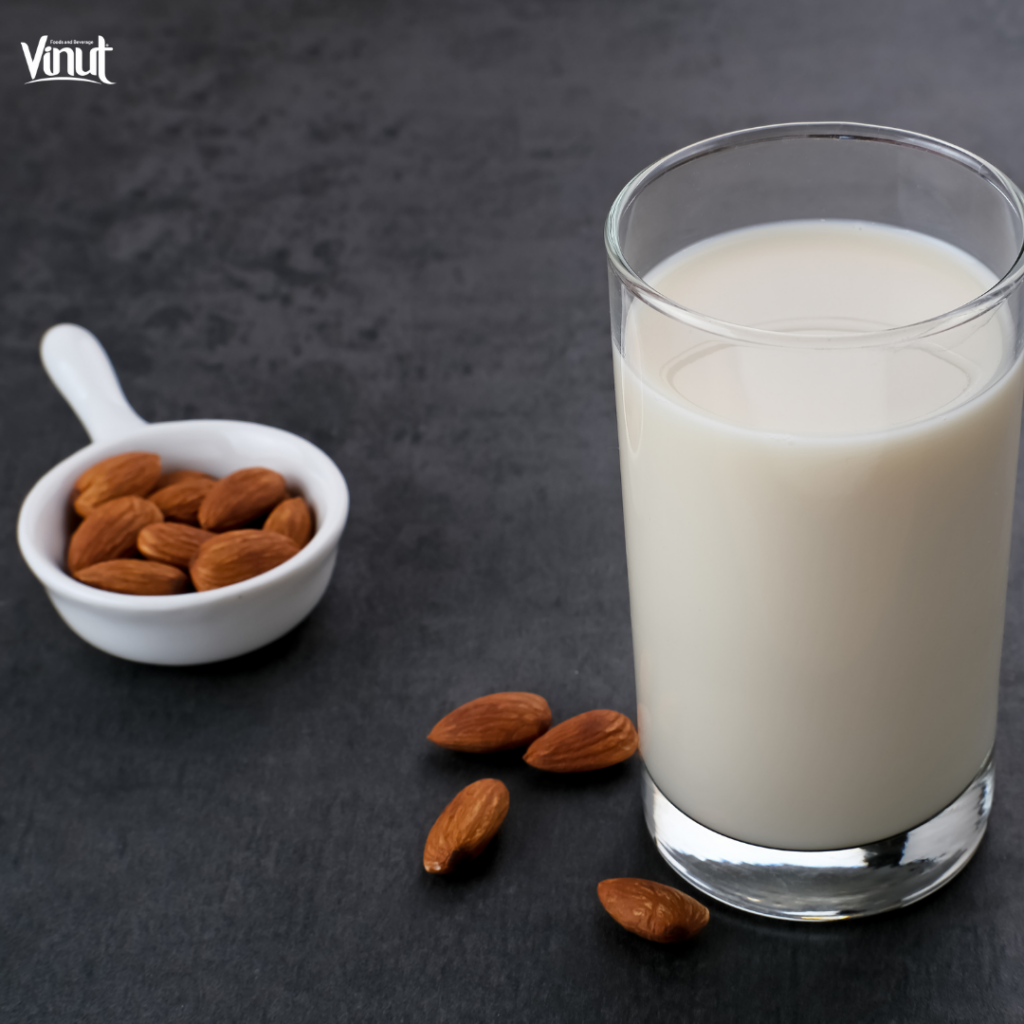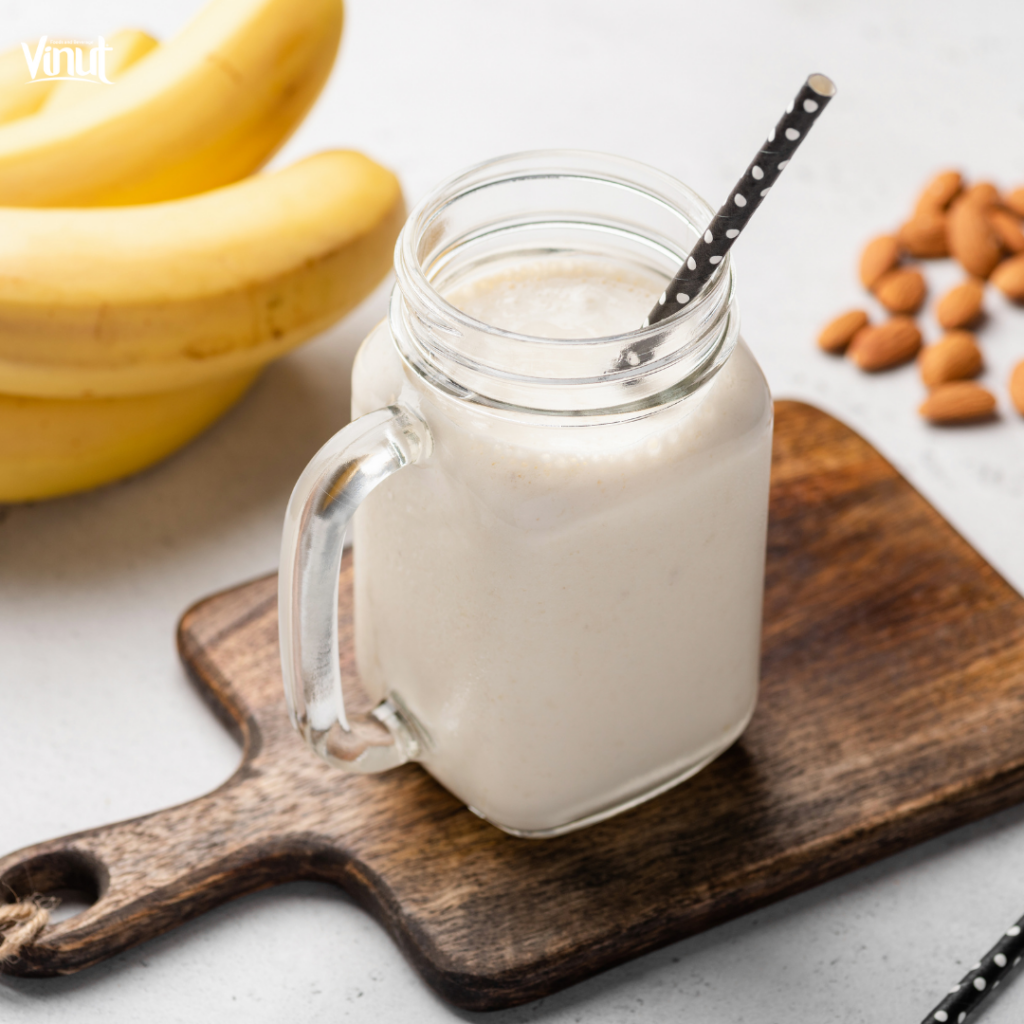
News
Can I Use Almond Milk in My Protein Shake?

Almond milk has become a popular alternative to dairy milk, especially for those who are lactose intolerant, vegan, or simply looking to reduce their dairy intake. Its mild flavor and smooth texture make it an excellent choice for a variety of recipes, including smoothies and shakes. But what about using almond milk in your protein shake? Cojo Cojo you’re wondering whether almond milk is a good choice for your post-workout beverage, you’re in the right place.

Table of Contents
Nutritional Benefits of Protein Shake Almond Milk
Before we dive into the specifics of using almond milk in protein shakes, let’s take a look at its nutritional profile. Almond milk is made by blending almonds with water and then straining the mixture to remove the solids. The result is a creamy, nutty-flavored liquid that is rich in nutrients.
Low in Calories
One of the biggest advantages of almond milk is its low calorie content. A cup of unsweetened almond milk typically contains around 30-40 calories, making it a great choice for those who are watching their calorie intake. This is significantly lower than the calorie content of dairy milk, which can range from 90 to 150 calories per cup, depending on the fat content.
Rich in Vitamins and Minerals
Almond milk is a good source of several essential vitamins and minerals, including vitamin E, calcium, and magnesium. Vitamin E is a powerful antioxidant that helps protect your cells from damage, while calcium and magnesium are important for bone health. Many commercial brands of almond milk are also fortified with additional vitamins and minerals, such as vitamin D and vitamin B12, making it even more nutritious.
Naturally Lactose-Free and Vegan
Almond milk is naturally free of lactose, making it an ideal choice for those who are lactose intolerant. It’s also 100% plant-based, so it’s suitable for vegans and those who are avoiding dairy for other reasons.
Low in Protein
One thing to keep in mind is that almond milk is relatively low in protein compared to dairy milk. A cup of almond milk contains about 1 gram of protein, whereas a cup of dairy milk contains about 8 grams of protein. However, since you’ll be adding protein powder to your shake, this isn’t necessarily a drawback.

Comparing Almond Milk to Other Milk Alternatives
Almond milk is just one of many milk alternatives available on the market. Other popular options include soy milk, oat milk, and coconut milk. Each of these has its own unique nutritional profile and flavor, so let’s take a moment to compare them to almond milk.
Soy Milk
Soy milk is the closest plant-based alternative to dairy milk in terms of protein content. A cup of soy milk contains about 7-8 grams of protein, making it a good choice if you’re looking to increase your protein intake. However, soy milk has a distinct flavor that some people find off-putting, and it may not be suitable for those with soy allergies.
Oat Milk
Oat milk is another popular alternative, especially for those who are allergic to nuts or soy. It has a slightly sweet, creamy flavor and is higher in carbohydrates than almond milk. Oat milk is often fortified with vitamins and minerals, but it’s lower in protein, with about 2-3 grams per cup.
Coconut Milk
Coconut milk has a rich, creamy texture and a distinct coconut flavor. It’s higher in fat than almond milk, with about 5 grams of fat per cup, most of which is saturated fat. Coconut milk is also lower in protein, with about 1 gram per cup, and it’s relatively high in calories, with about 45-60 calories per cup.
Almond Milk
In comparison, almond milk is lower in calories, fat, and protein, but it offers a light, mild flavor that pairs well with most protein powders. It’s also a good source of vitamin E and other nutrients, making it a healthy choice for many people.

Why Use Almond Milk in Your Protein Shake?
Now that we’ve covered the basics, let’s discuss why you might choose to use almond milk in your protein shake. Here are some of the key benefits:
Low-Calorie Option
If you’re trying to lose weight or maintain a healthy weight, using almond milk in your protein shake can help you cut down on calories without sacrificing flavor. Since almond milk is lower in calories than dairy milk and many other milk alternatives, it’s a great choice for those who are calorie-conscious.
Smooth, Creamy Texture
Almond milk has a smooth, creamy texture that blends well with protein powder. Unlike water, which can make your shake thin and watery, almond milk adds a rich, satisfying mouthfeel that makes your shake more enjoyable to drink.
Mild, Versatile Flavor
The mild flavor of almond milk makes it a versatile choice for protein shakes. It complements a wide range of protein powders, from chocolate and vanilla to more unique flavors like peanut butter or matcha. Whether you prefer a simple shake or a more elaborate smoothie with fruits and vegetables, almond milk can enhance the flavor without overpowering it.
Lactose-Free and Vegan-Friendly
For those who are lactose intolerant or following a vegan diet, almond milk is an excellent alternative to dairy milk. It’s naturally lactose-free and plant-based, so you can enjoy your protein shake without worrying about digestive issues or compromising your dietary choices.
Nutrient Boost
Almond milk is a good source of several essential nutrients, including vitamin E, calcium, and magnesium. By using almond milk in your protein shake, you’re not only getting the protein from the powder, but also additional vitamins and minerals that support overall health.

How to Make the Perfect Almond Milk Protein Shake
Ready to make your almond milk protein shake? Here’s a step-by-step guide to help you create a delicious, nutritious shake that meets your needs.
1. Choose Your Protein Powder
The first step in making a great protein shake is choosing the right protein powder. There are many options available, including whey protein, plant-based protein, and collagen protein. Consider your dietary preferences, fitness goals, and any allergies or intolerances when selecting your protein powder.
If you’re vegan or lactose intolerant, opt for a plant-based protein powder made from peas, rice, or hemp. If you’re looking to build muscle, whey protein is a popular choice due to its high bioavailability and complete amino acid profile.
2. Measure Your Ingredients
Next, measure out your ingredients. A standard protein shake typically includes 1 scoop of protein powder, which provides about 20-25 grams of protein. For the liquid, use 1 cup of almond milk. If you prefer a thicker shake, you can use less almond milk, or add more if you like a thinner consistency.
3. Add Extra Ingredients
To enhance the flavor and nutritional content of your shake, consider adding extra ingredients. Here are some ideas:
- Fruits: Add a banana, berries, or a handful of spinach for extra vitamins, minerals, and fiber.
- Healthy Fats: Include a tablespoon of nut butter, chia seeds, or avocado for healthy fats that support satiety and brain health.
- Sweeteners: If you prefer a sweeter shake, add a drizzle of honey, maple syrup, or a few drops of stevia.
- Spices: Cinnamon, vanilla extract, or cocoa powder can add flavor without extra calories.
4. Blend Until Smooth
Place all your ingredients in a blender and blend on high until smooth. This usually takes about 30-60 seconds, depending on the power of your blender and the ingredients you’re using. If your shake is too thick, add a little more almond milk or water to reach your desired consistency.
5. Enjoy Immediately
Pour your shake into a glass and enjoy it immediately. Protein shakes are best consumed fresh, as the texture and flavor can change if left sitting for too long.

Common Questions About Using Almond Milk in Protein Shakes
As more people explore the use of almond milk in protein shakes, several common questions arise. Here, we’ll address some of the most frequently asked questions:
Is Almond Milk Good for Weight Loss?
Yes, almond milk can be a good choice for weight loss, especially when used in protein shakes. Its low calorie content makes it easy to incorporate into a calorie-controlled diet, and its smooth, creamy texture adds satisfaction to your shake without excess calories.
Can Almond Milk Affect Protein Absorption?
There is no evidence to suggest that almond milk negatively affects protein absorption. However, since almond milk is lower in protein compared to dairy milk, you’ll need to rely on your protein powder to meet your protein needs.
Should I Use Sweetened or Unsweetened Almond Milk?
For the healthiest option, choose unsweetened almond milk. Sweetened versions often contain added sugars, which can contribute to excess calorie intake and may spike blood sugar levels. Unsweetened almond milk allows you to control the sweetness of your shake by adding your preferred sweeteners or fruits.
Can I Use Almond Milk in Any Protein Shake Recipe?
Absolutely! Almond milk can be used in any protein shake recipe that calls for a liquid base. Its mild flavor pairs well with a variety of ingredients, making it a versatile choice for different types of shakes.
How Does Almond Milk Compare to Water in Protein Shakes?
While water is the lowest calorie option for a protein shake, it lacks the creamy texture and flavor that almond milk provides. Almond milk adds richness and depth to your shake, making it more enjoyable to drink. Additionally, almond milk contributes extra vitamins and minerals, which water does not.

Conclusion
Almond milk is an excellent choice for protein shakes, offering a low-calorie, nutrient-rich alternative to dairy milk. Its mild flavor, smooth texture, and versatility make it a great option for a wide range of shake recipes. Whether you’re lactose intolerant, vegan, or simply looking to switch things up, almond milk can help you create a delicious, satisfying protein shake that supports your health and fitness goals.
FAQs About Using Almond Milk in Protein Shakes
1. Can almond milk be heated for hot protein shakes?
Yes, almond milk can be heated and used in hot protein shakes. Just be sure to heat it gently and not bring it to a boil, as high heat can affect the flavor and texture.
2. Can I use almond milk in protein shakes for muscle gain?
Yes, almond milk can be used in protein shakes for muscle gain, especially when paired with a high-quality protein powder. Just make sure to include enough protein in your diet to meet your muscle-building goals.
3. Is almond milk keto-friendly for protein shakes?
Unsweetened almond milk is low in carbs and can be a keto-friendly option for protein shakes. Be sure to choose a protein powder that aligns with your keto diet, such as one with minimal carbohydrates.
4. How long can I store a protein shake made with almond milk?
Protein shakes made with almond milk are best consumed immediately, but they can be stored in the refrigerator for up to 24 hours. Shake well before drinking, as the ingredients may separate over time.
5. Can I make my own almond milk for protein shakes?
Yes, you can make your own almond milk at home by blending soaked almonds with water and straining the mixture. Homemade almond milk is fresh and free from additives, making it a great choice for protein shakes.
